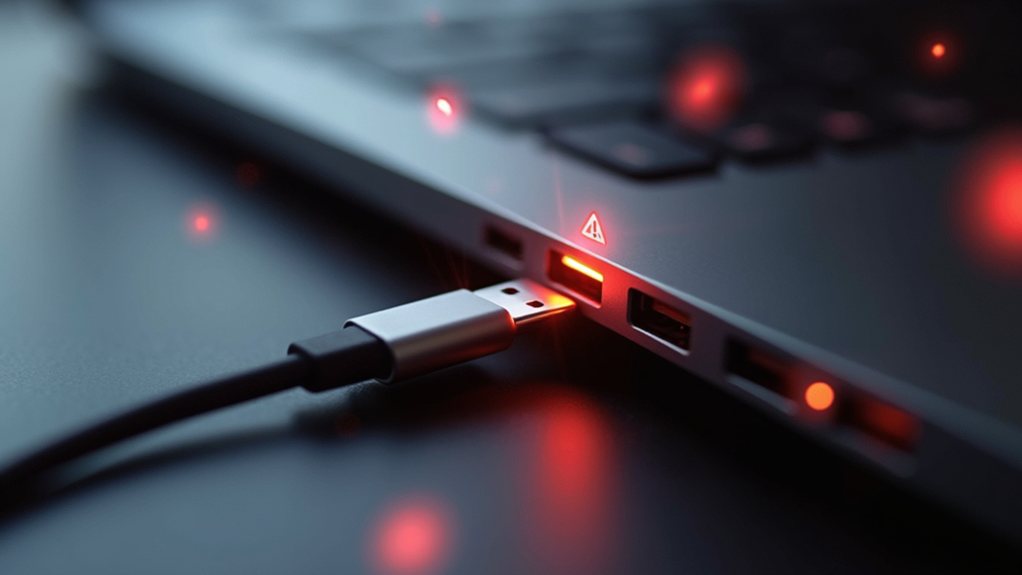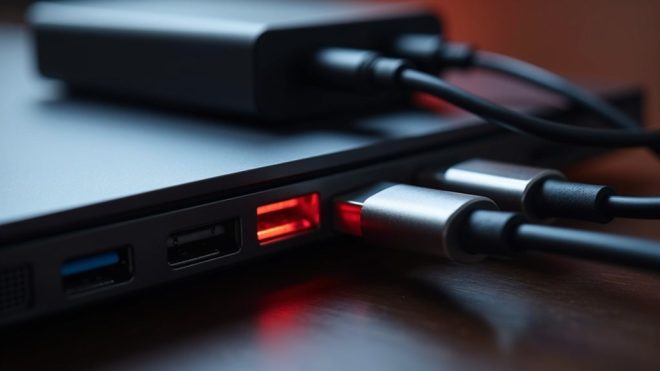Microsoft is ramping up pressure on PC manufacturers to fix widespread USB Type-C notification issues in Windows 11, where incorrect hardware configurations are putting devices at risk. The tech giant’s intelligent notification system, designed to prevent charging problems and hardware damage, relies heavily on proper OEM implementation of USB port capabilities. With USB-C becoming the universal standard, these persistent configuration issues threaten device longevity and user experience – making proper implementation more essential than ever.

The latest Windows 11 update brings an important improvement to USB Type-C management through an intelligent notification system designed to prevent hardware mishaps and charging headaches. Microsoft’s intelligent alert system aims to protect users from the perils of incompatible accessories, slow charging, and potential hardware damage by providing timely warnings and troubleshooting guidance.
However, this well-intentioned feature isn’t functioning as intended on many devices, and Microsoft has had enough. The tech giant is stepping up pressure on Original Equipment Manufacturers (OEMs) to address widespread configuration issues that are hampering the notification system’s effectiveness. The root of the problem? Incorrect ACPI markup, misclassified USB ports, and improper implementation of vital USB port capabilities. IT professionals must dedicate significant time to manual troubleshooting due to these configuration issues.
Microsoft’s frustration with OEMs grows as USB-C notification problems persist due to improper hardware configurations and port misclassification.
Think of it as having a sophisticated home security system where someone forgot to install the sensors properly – all the smart technology in the world won’t help if the foundation isn’t right. OEMs’ persistent mislabeling of ports and incorrect implementation of USB Port Capabilities (_UPC) and Physical Location of Device (_PLD) ACPI methods are fundamentally creating these blind spots in Windows 11’s notification system. Some manufacturers are further complicating the issue by disabling data transfers on certain ports due to security concerns in untrusted environments.
To combat these issues, Microsoft has deployed its Windows Hardware Lab Kit (HLK) tools, providing OEMs with the means to validate USB port descriptors and guarantee compatibility. The company isn’t just offering tools; it’s actively publishing advisories and recommendations, urging manufacturers to rigorously test various charging scenarios, including those involving low-power chargers and hubs.
The stakes are higher than you might think. When notifications fail to appear, users are left vulnerable to a range of issues – from the frustration of unexpectedly slow charging to potential hardware damage from incompatible accessories. It’s like driving a car with a malfunctioning check engine light; you won’t know there’s a problem until it’s too late.
For users, the impact of these missing notifications extends beyond mere inconvenience. Without proper alerts about charging issues or faulty connections, productivity takes a hit, devices may malfunction, and hardware lifespan could be shortened. The USB Settings in Windows 11 include various controls for managing these notifications, but they’re only effective when the underlying hardware is correctly configured.
Microsoft’s pressure on OEMs reflects a broader commitment to improving the Windows 11 user experience. The company recognises that in today’s interconnected world, where USB-C is becoming the universal standard for charging and data transfer, reliable notification systems aren’t just a luxury – they’re a requirement. As more devices adopt USB-C technology, the proper implementation of these notifications will become increasingly significant for maintaining device health and user satisfaction.
Final Thoughts
Microsoft is advocating for standardized USB-C notifications in Windows 11 to enhance the overall user experience as more devices utilize this technology. Clear communication regarding power delivery and connectivity is becoming increasingly important. While OEMs may encounter initial development expenses, the long-term advantages of uniform notifications will empower users to better comprehend their devices’ functionalities. This initiative reflects Microsoft’s ongoing commitment to creating a cohesive and user-friendly Windows ecosystem.
If you need assistance with USB-C issues or any other computer repairs, Computer Repairs Sunshine Coast is here to help. Don’t hesitate to reach out! Click on our contact us page to get in touch today.

